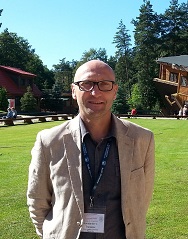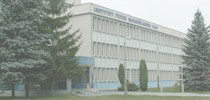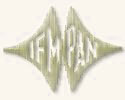 Konstantin V. Tretiakov
Konstantin V. Tretiakov
Professor
Head of the Department of Auxetics, Functional Materials, and Computer Simulations
Institute of Molecular Physics
Polish Academy of Sciences
ul. M. Smoluchowskiego 17
60-179 Poznan, POLAND
Room: 260
Phone: +48 61 8695276
Fax: +48 61 8684524
E-mail: tretiakov_AT_ifmpan.poznan.pl
Konstantin V. Tretiakov graduated summa cum laude in Industrial Electronics from
the Pavel Sukhoi State Technical University of Gomel (Gomel, Belarus) in 1994.
He received his Ph.D. degree in Physics from the Institute of Molecular Physics
Polish Academy of Sciences (Poznan, Poland) in 2000 (Advisor: Prof. Krzysztof Wojciechowski).
He received the 2000 Institute of Molecular Physics Award for his Ph.D. dissertation.
From 2000-2013 he was an Assistant Professor of the Department of Computer Simulations and Non-equilibrium Dynamics at the Institute of Molecular Physics Polish Academy of Sciences (with Prof. K. Wojciechowski).
In 2002 to 2004, Dr. Tretiakov was a Postdoctoral Fellow (with Prof. S. Scandolo) in
the Condensed Matter and Statistical Physics Section
at the Abdus Salam International Center for Theoretical Physics (Trieste, Italy).
Since 2007 he has been a member of the Scientific Council of the Institute of Molecular Physics.
In 2007-2009, Dr. Tretiakov worked with Prof. B. Grzybowski in
the Department of Chemical and Biological
Engineering at Northwestern University (Evanston IL, USA).
In 2011, Dr. Tretiakov earned his habilitation in Physics at the Institute of Molecular Physics, Polish Academy of Sciences (Poznan, Poland).
From 2014-2023 he has been an Associate Professor of the Department of Computational Physics of Complex Systems at the Institute of Molecular Physics Polish Academy of Sciences.
He received the Minister of Science and Higher Education Award for a significant achievement in scientific activity in 2020.
Since 2021 he has been a member of the editorial board of Computational Methods in Science and Technology. March 18, 2024, he received the title of professor of natural sciences in the discipline of physical sciences by the decision of the President of the Republic of Poland.
Since 2024 he has been the head of the Department of of Auxetics, Functional Materials, and Computer Simulations at the Institute of Molecular Physics, Polish Academy of Sciences.
He specializes in statistical physics and computer simulation of many body systems, with research focusing on non-equilibrium self-assembling systems,
soft matter transport properties, and solids' elastic properties
in particular auxetic materials exhibiting negative Poisson's ratio.
Last Update: May 2024









 Konstantin V. Tretiakov
Konstantin V. Tretiakov